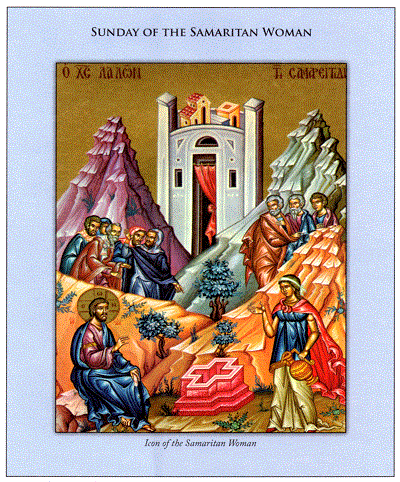 This fourth Paschal week begins with two rather disparate readings. I found it very difficult to come up with a common message that unites both of the readings. I finally settled on using the message of the Gospel reading, which also gives this week its name, to serve as the foundation for a message.
This fourth Paschal week begins with two rather disparate readings. I found it very difficult to come up with a common message that unites both of the readings. I finally settled on using the message of the Gospel reading, which also gives this week its name, to serve as the foundation for a message.
St. John, whose Gospel we are using during this Paschal season, uses the story of the Samaritan Woman as an opportunity to develop further the theme of the water of Judaism replaced by the life-giving water of Christ. The rabbinical and Qumran comparison of the Torah with water – as cleansing, as satisfying thirst and as promoting life – affords the background of John’s teaching. Once again Christ is the fulfillment of what the Law could only promise. John has Jesus say to the woman: “If only you recognized God’s gift and who it is that is asking you for a drink, you would have asked him instead, and he would have given you living water.” After presenting a verbal interaction between Jesus and the woman, John again has Jesus say: “But whoever drinks the water I give him will never be thirsty; no, the water I give shall become a fountain within him, leaping up to provide eternal life.” Jesus is talking about a way of living that saves life. A human cannot survive without water.
When Jesus speaks about living water, He is speaking of the water of life. The woman thinks of flowing water, so much more desirable than stale cistern water. This is a typical example of John’s use of a hearer’s misunderstanding in order to make a point.
So, John presents this Gospel story as a way of clearly saying that the teachings of Jesus and His way of living are like water that quenches thirst and promotes life. Again it should be remembered that rabbis used the idea of the Law as water that could cleanse and sustain life.
Given this theme about the Way of Jesus as being life sustaining, we hear in the Epistle that the converts in Antioch fully embraced the Way of Jesus and that they were the first ones to be called Christians, that is followers of Jesus, the Christ.
The name Christ, which is the Greek word christos, is the same as the Hebrew word mashiach of Messiah. They both mean “the anointed one of God.” So when the followers of Jesus were first called Christians it meant that they were the followers of the “anointed one of God.”
In calling Jesus “the Christ” the early Church was not saying that He was also God Himself. Instead they were saying that Jesus, like the prophets and Kings of Israel, was “an anointed person of God.”
We call ourselves Christians. Hopefully this means that we truly embrace the Jesus Way of Living OR are doing everything in our power to adopt His way of living so that we might truly become God’s children.
